Glass handling and processing equipment has evolved significantly from its ancient origins. Over 5,000 years, this technology has transitioned from basic glassblowing techniques to sophisticated machines used in cutting, tempering, laminating, and finishing. This evolution reflects not just advancements in glass itself but in the precision and efficiency of the equipment. Understanding this historical progression is crucial in navigating the modern landscape of glass processing and making informed equipment choices.
Popular Glass Handling and Processing Equipment
When it comes to glass manufacturing, the right equipment is essential for precision, efficiency, and safety. This section highlights key machines used in glass handling and processing, each playing a vital role in transforming raw glass into finished products. Understanding these tools is crucial for anyone involved in glass production or processing.
Glass Loaders
In the realm of glass processing, glass loaders play a crucial role. They are designed to safely and efficiently transport glass sheets from storage to the processing machines. Utilizing suction cups or other secure gripping mechanisms, these loaders minimize the risk of damage or breakage. Automated loaders have enhanced precision and reduced labor requirements, making them an essential tool in modern glass manufacturing facilities for their ability to streamline operations and maintain the integrity of the glass throughout the handling process.
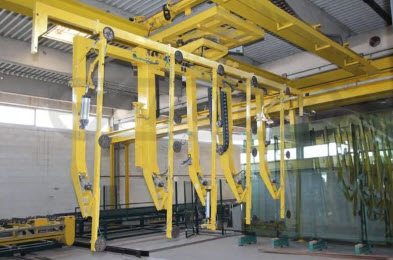
Glass Storage Racks
Glass storage racks are indispensable for organizing and protecting glass sheets. Designed to accommodate various sizes and weights, these racks ensure that glass is stored in a manner that prevents damage and maximizes space efficiency. The use of specialized padding or rubber coatings on the racks helps in avoiding scratches or cracks on the glass surfaces. In high-volume glass processing environments, well-designed storage racks are key to maintaining an orderly workflow and quick access to different types of glass, thus playing a vital role in overall operational efficiency.
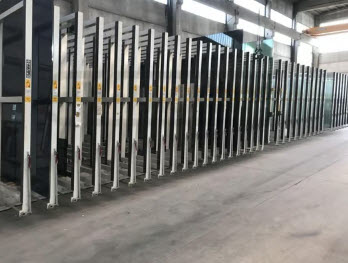
Glass Furnaces and Kilns
Glass furnaces and kilns are pivotal in the glass processing industry, primarily used for tasks like tempering, annealing, and fusing glass. These high-temperature ovens can uniformly heat glass to a specific temperature before cooling it down, crucial for enhancing its strength and durability. Modern furnaces offer precise temperature control and energy efficiency, making them suitable for producing a wide range of glass products, from architectural to automotive glass. The ability to maintain consistent temperatures is key to ensuring the quality and safety of the final glass product.
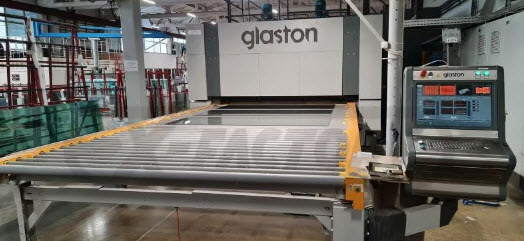
Glass Bending and Laminating Machines
Glass bending and laminating machines are specialized for shaping and strengthening glass. Bending machines heat glass until it’s pliable, then mold it to desired curves, essential for automotive windshields and architectural applications. Laminating machines, on the other hand, bond layers of glass with interlayers (like PVB or resin) under heat and pressure, enhancing the glass’s impact resistance and safety features. These machines are critical in producing laminated safety glass, used in various applications where durability and safety are paramount, such as in vehicles and building exteriors.
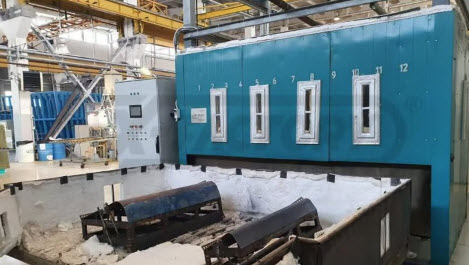
Glass Cutting Machines
Glass cutting machines are essential in the glass manufacturing process, providing precision and efficiency in shaping glass sheets to desired dimensions. These machines range from simple hand-held cutters to advanced CNC-controlled systems, capable of making intricate cuts with high precision. Modern glass cutting machines often feature computerized control for exact measurements and minimal waste, essential for both small-scale custom work and large-scale production lines. Their ability to deliver clean, precise cuts quickly is crucial in maintaining productivity and reducing material wastage in glass processing facilities.
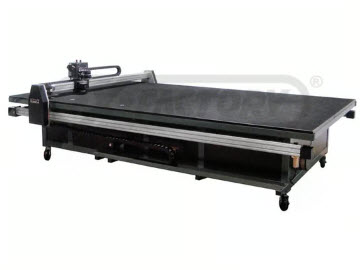
Glass Drilling Machines
Glass drilling machines in the glass industry are designed to create holes and apertures with accuracy and minimal risk of breakage. These machines, equipped with diamond-tipped drills or other specialized bits, can handle various glass thicknesses and types. Advanced models offer features like programmable controls and automated lubrication systems to enhance precision and prolong bit life. The ability of these machines to perform precise drilling operations without compromising the structural integrity of the glass is vital in applications ranging from simple home decor to complex architectural installations.
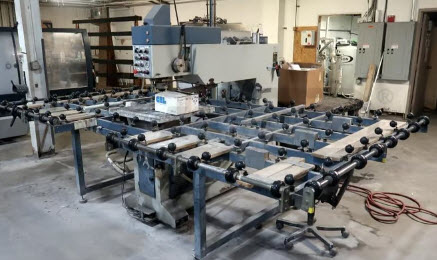
Glass Edging Machines
Glass edging machines are specialized for refining the edges of glass sheets, ensuring they are smooth and safe to handle. These machines can perform various edge finishes, from simple arris or chamfer cuts to more complex profiles like pencil edge or beveled edge. Advanced edging machines are equipped with diamond or polishing wheels, enabling them to work efficiently on different glass thicknesses and types. Their ability to provide high-quality edge finishes is essential in applications where the aesthetic and functional aspects of glass edges are critical, such as in furniture, mirrors, and architectural glass.
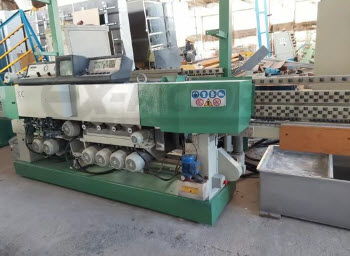
Glass Cleaning Equipment and Washers
In glass processing, cleanliness is crucial. Glass cleaning equipment and washers are used to remove dust, fingerprints, and other contaminants from glass surfaces before, during, and after processing. These systems range from simple hand-washing stations to sophisticated automated washers that incorporate brushes, water jets, and drying systems. Effective cleaning ensures that subsequent processing steps, like coating or laminating, are successful and that the final product maintains its visual clarity and quality.
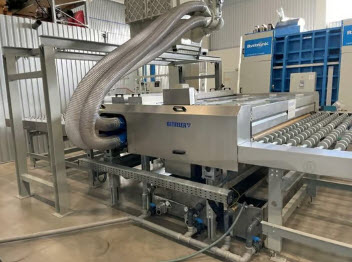
Glass Quality Inspection Equipment
Glass quality inspection equipment plays a pivotal role in the glass industry, ensuring that each product meets stringent standards. This equipment includes tools and systems for detecting defects, measuring thickness, analyzing surface flatness, and assessing optical properties. Advanced inspection systems often use technologies like laser scanning and machine vision to provide accurate, non-contact measurements. Reliable quality inspection is critical in maintaining the safety, performance, and aesthetic standards of glass products, especially in applications with high safety requirements like automotive and architectural glass.
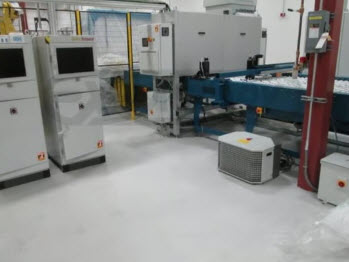
What to look for when buying Glass Manufacturing Equipment
Selecting the right glass manufacturing equipment is a crucial decision that impacts the quality, efficiency, and cost-effectiveness of your production. Below you will find several essential factors to consider, aimed at guiding you towards informed purchasing decisions that align with your specific operational requirements and objectives.
- Functionality and Specific Requirements: Understand the specific needs of your production process. Different types of glass manufacturing require different equipment. For instance, tempered glass production demands different machinery compared to laminated glass production.
- Quality and Durability: High-quality equipment may have a higher initial cost but can offer greater durability and efficiency in the long run. Look for machines made with robust materials and designed for heavy-duty use, especially if your production volume is high.
- Technological Advancements: Opt for equipment with the latest technology. Features like computerized controls, automation, and energy-efficient designs can significantly enhance productivity and reduce operational costs.
- Manufacturer Reputation and Support: Choose equipment from reputable manufacturers known for reliability and quality. Also, consider the availability of customer support, maintenance services, and spare parts.
- Safety Features: Safety should be a top priority. Ensure the equipment comes with necessary safety features to protect operators and minimize the risk of accidents.
- Compatibility with Existing Systems: If you are integrating new equipment into an existing production line, ensure compatibility with your current machinery. This includes physical dimensions, power requirements, and operational workflow.
- Cost-Effectiveness: While quality is paramount, it’s also important to consider the overall cost-effectiveness of the equipment. This includes not only the purchase price but also operating costs, maintenance expenses, and potential downtime.
- Scalability: If you anticipate growth or changes in your production needs, choose equipment that can be easily upgraded or scaled to meet future demands.
Applications for Glass Fabrication
Below we outline the diverse applications of glass fabrication across various industries, highlighting the unique properties and functionalities that glass brings to each field.
- Construction: Glass is a fundamental element in modern construction, used in windows, doors, façades, and interior partitions. It offers not just transparency but also insulation, UV protection, and aesthetic appeal. Advanced fabrication techniques have enabled the production of energy-efficient and safety glass, crucial for green building and urban architecture.
- Automotive Manufacturing: In automotive manufacturing, glass plays a vital role in windshields, windows, and sunroofs. Fabrication technologies have led to the development of stronger, safer, and more lightweight glass, enhancing vehicle safety and fuel efficiency.
- Furniture and Lighting: Glass adds elegance and functionality to furniture and lighting. Fabrication techniques allow for the creation of durable and decorative glass elements in tables, shelving, light fixtures, and more, offering a blend of style and practicality.
- Food and Beverage: Glass is widely used in the food and beverage industry for packaging, due to its non-reactive nature and ability to preserve product quality. Fabricated glass containers are essential for storing everything from water and soft drinks to sauces and spirits.
- Medical Research and Healthcare: In medical research and healthcare, fabricated glass is used in various applications like laboratory equipment, diagnostic devices, and pharmaceutical packaging. Its chemical inertness and clarity make it ideal for sensitive medical environments.
- Consumer Electronics: The consumer electronics industry heavily relies on glass for screens, touch panels, and protective covers. Fabricated glass in this sector needs to be highly durable, scratch-resistant, and responsive to touch.
Surplus Record: Tips and Tricks
To assist in your search for used glass handling and processing equipment for sale on our platform, we have attached some of our best tips and tricks to make finding your optimal equipment a little bit easier.
- Make use of our Location Settings: At the top of the page, when on the list for your desired piece of equipment/machinery, enter your desired location and you’ll be taken directly to what we have available in your area.
- Looking for an Auction?: On the listing page, select the blue checkbox on your right which says “Auction” and you shall be taken to our available products for sale that are on auction.
- On a Budget?: Select the toggle “Sort by Relevance” and then click “Price low to high” to view our cheapest to most expensive products for sale.
- Don’t forget the Search Bar: Already know what you are looking for? Utilize our search tab at the top of your page to find specific listings out of hundreds available.
Need More Help? or information about glass handling and processing equipment? Still can’t find what you’re looking for or need more advice from a professional dealer? Head on over to the “Wanteds” section of our website and select “Buy” at the top and “General Equipment” for the industry. Fill out the form and a dealer that specializes in glass handling and processing equipment will get back to you ASAP. It’s free to do, and our dealers are happy to help out!

